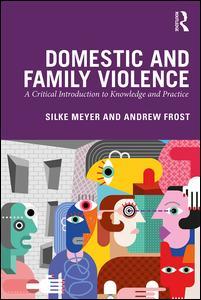Domestic and Family Violence A Critical Introduction to Knowledge and Practice
Auteurs : Meyer Silke, Frost Andrew

Domestic and family violence (DFV) is an enduring social and public health issue of endemic proportions and global scale, with multiple and lasting consequences for those directly affected. This book tackles current debates in the field and addresses the social norms and settings that perpetuate this type of violence, along with implications for service delivery.
The book offers a thorough introduction into the nature and extent of DFV in contemporary social contexts and serves as a foundation for informed practice. It provides a firm theoretical and empirical overview of core issues, covering the challenges and support needs experienced by those affected, along with the implications this raises for the range of relevant response services. The authors also offer insight into the predominantly gendered nature of DFV and its influence beyond the traditional couple context, across age, gender, sexual orientation, cultural background, and family relationships. Drawing on theoretical explanations, international research, and practice experience, they highlight examples of good practice and holistic responses, including primary, secondary, and tertiary prevention.
Written in a clear and direct style, this book will appeal to students and scholars of criminology, sociology, and social work engaged in studies of domestic and family violence, violence against women, and intimate partner violence. It will be an invaluable resource for those designing, coordinating, and conducting service responses.
Part 1: The Context 1. Introduction 2. The nature and prevalence of domestic and family violence 3. Theoretical strands Part 2: The People 4. Enacting violence in private spaces: Understanding perpetratorhood 5. Resisting violence in private spaces: Understanding victimhood 6. The burden on children Part 3: Diversity 7. Not just a heterosexual, intimate relationship problem 8. The vulnerability of the displaced and the dispossessed: Matching services to migrant and indigenous populations Part 4: Responding 9. Tackling domestic and family violence: Primary, secondary and tertiary prevention 10. Responding to domestic and family violence: Good practices 11. Conclusion
Silke Meyer is an Associate Professor at Monash University and Adjunct Associate Professor at CQUniversity, Australia. Silke is a criminologist and social worker by training, bringing practical and theoretical expertise to her research, teaching, and writing. Her research centres on different aspects of domestic and family violence, including women and children’s safety and wellbeing, men’s accountability in their role as perpetrators and fathers, experiences specific to Aboriginal and Torres Strait Islander communities and the role of domestic and family violence-informed practice in child protection, policing, and court proceedings. Silke’s research has been published and cited widely and continues to inform policy and practice in areas of victim- and perpetrator-related service delivery.
Dr Andrew Frost leads a team of educators in the Domestic and Family Violence Practice program at CQUniversity, Australia. Andrew has been working, teaching, and researching in offender rehabilitation since 1993. His practice and award-winning research into group work with violent offenders, along with the establishment of a forensic therapeutic community, has spawned a range of publications across books and academic journals. Theoretical models and other outcomes from this work have been used by state, NGO, and independent service providers to inform practice.
Date de parution : 06-2019
15.6x23.4 cm
Date de parution : 06-2019
15.6x23.4 cm
Thèmes de Domestic and Family Violence :
Mots-clés :
Long Term Academic Performance; Violence Against Women; Mandatory Reporting Policies; Intersectionality; Conflict Resolution Competence; Intimate Partner Violence; Formal Support Sources; Family Justice Centres; Violent Victimisation Experiences; Gendered Violence; Good Lives Model; adolescent family violence; National Domestic Violence Hotline; gender symmetry; Adolescent Dating Violence; dating violence; Intimate Partner Sexual Assault; non-lethal strangulation; Intimate Partner Homicides; social learning theory; IPV; Desistance Paradigm; Non-abusive Parent; Support Sources; Adult IPV; Elder Abuse; Informal Care Relationships; Tertiary Prevention; Intersectional Disadvantage; ODARA; Tertiary Prevention Strategies; Common Language; Conditional Case


